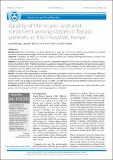Quality of Life in Pre- and Post Treatment among Obstetric Fistula Patients at Kisii Hospital, Kenya
Publication Date
2012-10Type
Article, Journalviews
downloads
Metadata
Show full item record
Abstract/
Background Urinary incontinence has been noted to be a major barrier to social activities, entertainment or physical recreation. Ample evidence suggests that urinary incontinence affects a person’s quality of life. Objective To establish the impact of a combined surgical procedure and health promoting intervention to quality of life in women treated for obstetric fistula. Method This prospective study focused on women undergoing treatment in Kisii Level Five Hospital in Nyanza Region, Kenya in September 2009. Treatment comprised surgical care, physiotherapy, health education and psychosocial support. The outcome parameters were self-reported incontinence and quality of life measured by the psychometric tool; King Health Questionnaire (KHQ), obtained upon admission and at six months follow-up. Ethical accept was obtained from the AMREF Scientific and Ethical Review Committee. Results 53 women were interviewed at baseline and 40 were followed up after six months. 27 of 40 patients (68%) had vesicovaginal fistula, the other 12 patients (30%) had recto-vaginal fistula, while 1 (3%) patient had both. Full continence was achieved for 26 of the 40 (65%), and an additional 9 patients (23%) had improved from continuous to stress incontinence. Only 5 of 40 patients had failed repair (p < 0.05). The KHQ outcomes showed significant improvements for all dimensions of quality of life measure, except personal relationships. Conclusion Women with obstetric fistula were found to drastically improve the continence and quality of life after undergoing a combined surgical and health promoting programme in hospital.
Subject/
Urinary incontinence; Surgical procedure; Health promotion; Physiotherapy; Psychometric; Kisii; Kenya; Gynaecology
Publisher
Clinical Health PromotionCollections
- General - GEN [367]

